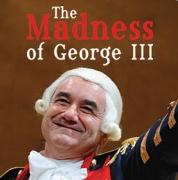The Madness of George III
It was back in 1991 that this play by the immensely popular playwright Alan Bennett first shone its light on the ailment that made King George III seem completely mad. Twenty years later, this revival directed by Christopher Luscombe and emanating from the Theatre Royal, Bath back in August last year, is a welcome return. Mr Bennett's play was turned into a film in 1994, with the name changed to 'The Madness of King George', and directed by the National Theatre's artistic director, Nicholas Hytner.
George III reigned as King of England for 60 years from 1760 to 1820. The play focuses on the condition which affected King George (affectionately known as 'Farmer George' due to his passionate interest in agriculture) in the later part of his life. The symptoms baffled doctors of the time, and Alan Bennett pulls no punches when making these supposedly intelligent men look foolish and impotent. The symptoms involved abdominal pain, seizures and mental disturbance, and the King's urine apparently turned blue. Today, doctors suggest that he may have been suffering from an inherited blood disorder called porphyria.
When we first meet King George in the play he is sane enough. In fact, he rules his court with fairly rigid discipline. But his descent into illness starts with stumbling over words. Then, when he goes to bed, he tells the Queen ('Mrs King', as he calls her) that he is strangely hot. From thereon in the King's descent is swift - among other things, he rambles ridiculously and makes amorous advances towards the female members of the court.
The King's illness causes huge alarm in political circles. The Prime Minister, William Pitt, knows that if the King is declared insane, his son will become Regent and Pitt's party will be out of office and Charles Fox's party will be in government. The King's doctors cannot agree on remedies and so help is sought from Dr Willis (Clive Francis) who undertakes a course of treatment that involves controlling the King by physically restraining him in a chair designed for the purpose.
Following in the footsteps of Nigel Hawthorne, who played King George in both the initial run at the National and in the film, is hardly a piece of cake, even for an actor of the calibre of David Haig. But then Mr Haig does have a considerable knack for playing characters who either are or become manic, as those of us who saw him in 'Yes, Prime Minister' in the autumn of 2010 can testify. Here, though, Mr Haig is totally in control when we first meet him, which contrasts superbly to his demise when the disease takes hold. It is not all screaming and shouting, as you might imagine. There are very poignant moments when the King is actually quite lucid and knows that there is something seriously wrong with him, and this is actually quite painful to watch.
Nicholas Rowe is the clinical, humourless William Pitt, the consummate professional politician who engineers an economy drive in order to reap the glory when the public accounts turn out to be better than expected (obviously austerity is not new). Beatie Edney proves loyal and devoted as the King's wife Queen Charlotte who, until his illness had never spent a day apart from him. And Christopher Keegan is the high-voiced Prince of Wales who is anxious to gain the reigns of power, even if he more accustomed to idling his time away with mistresses and eating himself into oblivion.
Janet Bird's design focuses on simplicity and is decoratively and economically functional - so don't expect reconstructions of ornate palaces or that sort of thing. Still, it is enough to suggest the dignity and expense of royalty and the stuff of kingly life.
Shoehorned into the dim recess of the back row of the stalls, I had such a restricted view of the proceedings that I guess I saw less than 20% of the action. That was just about enough to give an overall impression, but rather too little to venture very far into detail, I'm afraid. But what I did see was an impressive revival, which will largely be remembered I suspect for a very fine performance by David Haig.
"Haig is simply magnificent."
Charles Spencer for The Telegraph
"David Haig, as mad King George, nearly gives one of the great performances of the decade"
Quentin Letts for The Daily Mail
External links to full reviews from popular press
Telegraph
Originally published on
